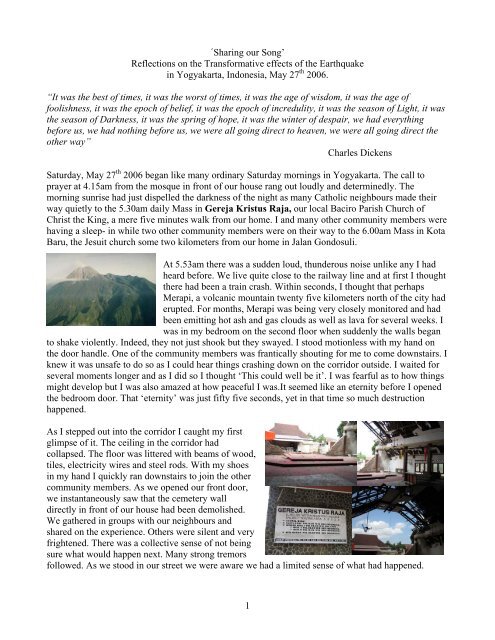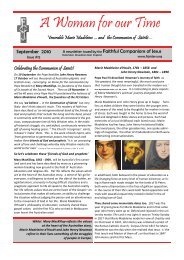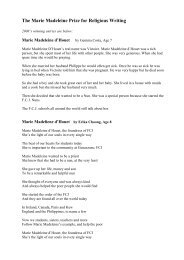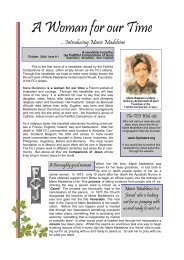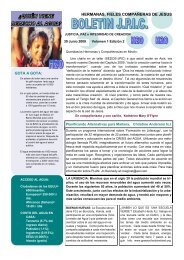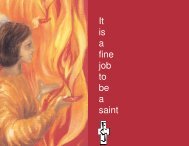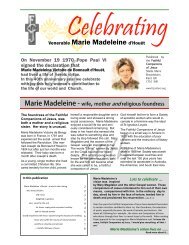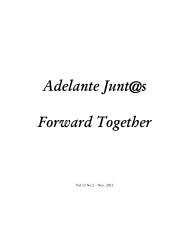here - FCJ Sisters—Faithful Companions of Jesus; FCJs
here - FCJ Sisters—Faithful Companions of Jesus; FCJs
here - FCJ Sisters—Faithful Companions of Jesus; FCJs
Create successful ePaper yourself
Turn your PDF publications into a flip-book with our unique Google optimized e-Paper software.
That was quickly expanded somewhat as Ibu Mar, our neighbour, arrived in a very shocked state andbegan to tell the story <strong>of</strong> what had happened in our Parish Church w<strong>here</strong> she was attending Mass. Theearthquake just happened as people were receiving communion. One end <strong>of</strong> the church totallycollapsed and the congregation had to crawl through the debris to get to safety. Pak Dwi, thesacristan,who was waiting to ring the 6.00am Angelus bell was instantly killed. Ibu Maria Rebi, aneighbour who was an elderly lady could not escape the tumbling wall <strong>of</strong> her house and she too waskilled instantly. These were the first <strong>of</strong> many, many stories that were to be repeated over and overagain in the coming hours and days.Both land lines and cell phones were down and communication with our Sisters in Soropadan at thenorthern end <strong>of</strong> the city was impossible. After ninety minutes we returned to the house. Our exit earlierwas so fast that I had not noticed many things. Our motorbikes, six in all, were strewn on the garagefloor like children’s toys. The organ in chapel was overturned and the cupboards in our dining roomwere emptied <strong>of</strong> their contents. Many ro<strong>of</strong> slates were dislodged and broken and we had numerouscracks in the walls <strong>of</strong> the house.I was in need <strong>of</strong> a shower and so ran quickly upstairs to my bedroom, gat<strong>here</strong>d some clothes and othernecessary belongings, came downstairs and washed as quickly as possible in the guest bathroom nearthe front door. Before I had dressed, I could hear people shouting and running. I was unsure as to whatwas going on. Then I realized that people running on the street were shouting at us to leave the housebecause t<strong>here</strong> was a tsunami. Thousands <strong>of</strong> people were moving northwards in cars, on motorbikes andon foot. T<strong>here</strong> was an air <strong>of</strong> sheer panic and pandemonium. All were shouting “Air naik. Tsunami,keluar lari”… “The water is rising. T<strong>here</strong> is a tsunami, get out and run.” With the community I left thehouse instantly. We did not wait to lock the doors. Like many others fleeing that morning I was notdressed properly, I was simply wearing a kaftan which is similar to a house dress. On this occasion Idid however have shoes on.As we left the house, Maryrose, Sisca and I walked together while Wina and Meita walked behind us.We walked northwards as fast as we could. We were hoping to head towards Soropadan w<strong>here</strong> ourother community lived but were not allowed access to the main road in that direction. We decided togo via a detour to the east. T<strong>here</strong> was little talk as we walked. I was stuck by the peaceful sense inwhich we walked together. For the second time in two hours I said to myself, “This could well be it”and once again I was surprised by the inner peace that I experienced. I had a sense that if we were todie we would die together. That companionable sense brought great peace and comfort.As we passed a particular house we heard somebody clapping loudly andcalling our names. It was Ibu Rini, a neighbour. We looked up and saw her andher petrified young daughter sitting on the highest point <strong>of</strong> the ro<strong>of</strong> <strong>of</strong> a house.They called to us to climb up to safety. Maryrose did not think she would beable to climb the wall that gave access to the ro<strong>of</strong>. With the help <strong>of</strong> an upturnedwheel barrow and by process <strong>of</strong> being pulled by Sisca and pushed by meshe was able to climb as far as the lowest part <strong>of</strong> the ro<strong>of</strong>. As we stood on aledge no wider than the width <strong>of</strong> our feet, t<strong>here</strong> was a strong tremor. The wallshook beneath us.Once more I realized the danger we were facing. The ro<strong>of</strong> was a relatively safeplace to be if t<strong>here</strong> was a tsunami but very dangerous in the event <strong>of</strong> anot<strong>here</strong>arthquake or strong tremor.2
The immediate aftermath <strong>of</strong> the earthquake was a confusing time; a time <strong>of</strong> not knowing what was thebest choice under the circumstances. However, for me it was also a time for trusting, reaching out,taking risks, being a leader, facing whatever needed to be faced and being a companion to many in themost unforeseen, unexpected and unprepared for circumstances.“All changed, changed utterly,A terrible beauty is born”William Butler YeatsThe external, physical landscape had changed utterly, mountains <strong>of</strong> rubble replaced homes, therice fields which were the main supply <strong>of</strong> foodand work dried up andcrops simply died because the irrigation system inareas was ruined.Regular, strong aftershocks were a reminder thatthe once taken forgranted earth was no longer stable under our feet.Because <strong>of</strong> theserealities, education at all levels which is so highlyprized by the Javanesewould be a luxury for a minority. The certainties<strong>of</strong> their lives and dreamsfor their immediate future crumbled with theirhouses. The fragility <strong>of</strong>the earth was a reminder <strong>of</strong> the fragility <strong>of</strong> their lives. In such a short space <strong>of</strong> time, many becamehomeless, motherless, fatherless, childless and jobless.The internal emotional (and spiritual) landscape changed also.A generalair <strong>of</strong> insecurity was accompanied by a high level <strong>of</strong> anxietyand a sense<strong>of</strong> always being on the alert. Home was no longer a trusted,safe placeto be. Even those with homes which had damage to variousdegreesslept outdoors. People were highly traumatized and this wasmanifestedin multiple ways from the involuntary body spasms, the nightmares and sleepless nights, inability tocommunicate or incessant talking, children with empty eyes unable to interact and play. Grief and losswas everyw<strong>here</strong>.Yet in the face <strong>of</strong> these realities, generally the people wereremarkablyresilient. This ability to face hardship was perhaps honed andrefined byyears <strong>of</strong> suffering and loss, years <strong>of</strong> struggling with nature andlack <strong>of</strong> trustin the government. A strong contributory factor to thepeople’sresilient nature lies in their belief as Muslims. The acceptance<strong>of</strong> fate inJavanese culture is very strong. God is very real, a regular part<strong>of</strong> their livesand is no stranger in ordinary, everyday conversations. Standing in themidst <strong>of</strong> the rubble and debris <strong>of</strong>their mosques they prayed. Theyreturned to their homes and salvagedwhat could be used in order to buildtheir lives again. Sadly, for some, theordeal was too much, it was too heavya burden to place on already heavily,weighed down shoulders and theycommitted suicide. An image thatstays clearly in my mind is that <strong>of</strong> ayoung mother who had hangedherself from a small tree outside herhome and the background is one <strong>of</strong> totally destroyed houses and mounds <strong>of</strong> debris and ruins. For her,hope was no longer accessible at that point in her life.3
“A terrible beauty is born”The emerging humanitarian crisis brought our group and many others together in our desire to help.We were too late for some but we resolved to give help as widely as we could and especially to go tothose least likely to receive help from others. The despair, the devastation and the wounded bodies,hearts and spirits <strong>of</strong> people called us to bring hope, companionship, to rebuild and to bring healing inwhatever way we could.Our two communities in Yogyakarta are primarily formation communities. Most <strong>of</strong> our sisters are inthe early stages <strong>of</strong> religious life. Within hours <strong>of</strong> the earthquake, both communities swung into actionand were immediately involved in responding to the enormous humanitarian needs that were beginningto emerge. Some <strong>of</strong> our sisters went to help as volunteers in Panti Rapih, the Catholic hospital inYogyakarta. Wounded lay in every available space filling both the hospital and the car parks. To add tothe suffering and misery <strong>of</strong> those lying out in the open on that first day torrential rain fell incessantlyboth day and night. T<strong>here</strong> were insufficient beds, and t<strong>here</strong> was a desperate shortage <strong>of</strong>shelter, clothing and medicine. Some members <strong>of</strong> our community started looking forrelief supplies while others began to establish networks with other organizations:religious, the church, our students, NGO’s, neighbours and friends. We were one inheart and mind in our desire to respond to those in need. Both communities becamehives <strong>of</strong> activity, attracting numerous volunteers from various faiths, including doctorsand nurses from Jakarta and even as far away as Malaysia and the United States. These“mostly anonymous performers” <strong>of</strong>fered their skills, time, and love. Within two days we had transportand drivers as well as many <strong>of</strong> the resources needed in the villages.Weestablished a very close connection with an NGO from the NorthAmerica called Sa maritan’s Purse. They are a committed Christiangroup who had extensive financial resources but no knowledge <strong>of</strong> thelocal area, language, culture or customs. The <strong>FCJ</strong> Sisters on the otherhand were the opposite . We had limited financial resources but greatknowledge and understanding <strong>of</strong> the people and the culture. From aprovidential meeting as both groups searched for supplies we created awonderfully creative partnership and network which is still operating today.This experience has confirmed my utter belief in networking, in doing togetherwhat we simply could not do effectively on our own. A single drop <strong>of</strong> water ispowerless but combined with others makes a mighty ocean creating life andenergising itself and others.4
Just as the earthquake was powerful and unexpected so was the tangible presence <strong>of</strong> God in so manyplaces and people. It struck me that God’s all pervasive loving presence rated much higher than theearthquake on the Richter scale! As we and other relief workers began to move out into the villages Ifound I was repeatedly touched by the reality <strong>of</strong> people’s lives and the presence <strong>of</strong> God among andwithin them. God was present in the most ordinary, simple, loving acts.“W<strong>here</strong> the sow roots,W<strong>here</strong> the hen scratches,We dipped our fingersIn the pockets <strong>of</strong> God”Patrick Kavanagh.God’s generosity and loving kindness oozed from people. On the day after the earthquake we tooktents, blankets, medicine and food to Wirokertin, one <strong>of</strong> the badly affected villages. The following daywe went further into a more remote area to a village called Glagah. We were met in Glagah by thevillage head who openly wept copiously because we had come to help. All the villages we helped werepredominantly Muslim. We were welcomed everyw<strong>here</strong> we went. One <strong>of</strong> the many things thattouched me was the fact that the people <strong>of</strong> Wirokerten who had received help from us the previous dayhad already been to Glagah and shared the little they had with this more remote neighbouring village.Such acts <strong>of</strong> generosity, unselfishness and loving kindness were repeated in many various ways overthe coming weeks. Those who were the poorest <strong>of</strong> the poor became for me symbols <strong>of</strong> the Widow <strong>of</strong>Zarephath who shared what little she had and trusted God would replenish the flour and oil that wasneeded for the following day’s bread and nourishment. “The woman went and did as Elijah told herand they ate the food, she, himself and her son. The jar <strong>of</strong> meal was not spent nor the jug <strong>of</strong> oilemptied, just as Yahweh had foretold through Elijah” (1Kings 17: 15, 16)So <strong>of</strong>ten, I was reminded that God had come to live among the people. God came as the GoodShepherd <strong>of</strong> whom Ezekiel spoke, as the one who wished to tend this suffering, precious flock inperson. The poor <strong>of</strong> Yogyakarta and the surrounding areas, like the Israelites, were neglected by therulers and leaders. However, God intervened via the impulse, the strong drive to respond that burnedwithin many <strong>of</strong> us. I was vividly aware <strong>of</strong> God within our group, within others and within me.“I am going to look after my flock myself and keep all <strong>of</strong> it in view…I shall rescue them fromw<strong>here</strong>ver they have been scattered during the mist and darkness…I shall pasture them on themountains <strong>of</strong> Israel, in the ravines and in every inhabited place in the land…I myself will pasture mysheep. I myself will show them w<strong>here</strong> to rest-it is the Lord Yahweh who speaks. I shall look for thelost one, bring back the stray, bandage the wounded and make the weak strong. I shall watch over thefat and healthy. I shall be a true shepherd to them.” Ezekiel 34:11-16.Through the efforts <strong>of</strong> some <strong>of</strong> the survivors themselves and through the contribution <strong>of</strong> relief workers,including ourselves God ministered to God’s people. I was regularly struck by God’s presence whenthe result so <strong>of</strong>ten seemed far, far greater than our efforts.The changed external landscape affected my inner landscape also. It was as if my body experienced aconstant ripple effect, an internal action replay <strong>of</strong> the physical motions and movements <strong>of</strong> the fifty fivesecond earthquake. I experienced being constantly on the alert, constantly assessing the strength <strong>of</strong>tremors and deciding how best to respond with the community in mind. For three weeks, I went to bedfully dressed, ready to respond as quickly as possible in the event <strong>of</strong> a serious tremor or earthquakewhich might happen during the night. I quickly established a ritual <strong>of</strong> checking that my shoes werestrategically placed so that in the event <strong>of</strong> something happening suddenly, I would swing out <strong>of</strong> bedand my feet would land immediately in my shoes. The big torch placed between my shoes could be5
quickly picked up. A bag with simple necessities was directly in front <strong>of</strong> the shoes and torch, the cellphone lying on top <strong>of</strong> the bag was being recharged as I had some restless sleep. This strategy wastested on a number <strong>of</strong> occasions.In the face <strong>of</strong> the earthquake I felt compelled to act, not out <strong>of</strong> duty or a desire to achieve which has so<strong>of</strong>ten motivated me in the past but rather out <strong>of</strong> compassion and a desire to be with the people in theirtime <strong>of</strong> need. I had never felt more closely connected with them. T<strong>here</strong> was a heart connection that wasdeeper than at any other point in the fourteen years I was in Indonesia. I was overtaken by anextraordinary energy and for two weeks ate and slept very little. My only focus was to be a companion,a person <strong>of</strong> hope and to bring help and support to as many as possible. Scripture spoke to me in a verystrong manner throughout this time. I experienced the reality <strong>of</strong> how the Word <strong>of</strong> God was so alive andactive in the circumstances. It became my daily nourishment.When on the day after the earthquake we opened our community doors to the wider community withlittle other than ourselves and some resources I had doubts about how it would go and how we wouldsustain it but I also had a strong sense it was the right thing to do. We had limited financial resourcesand we used them all at the initial emergency stage. However, once people saw we were activelyworking in the villages and dealing with villages rather than individual families or individual people allkinds <strong>of</strong> help began to come. Numerous volunteers arrived at our door <strong>of</strong>fering their services. TheSamaritan’s Purse provided us with two mini buses, drivers and petrol each day for three weeks.Neighbours and others previously unknown to us came with buses, cars and pick-up trucks. OurProject Fund bank account was replenished just as miraculously as the Widow <strong>of</strong> Zarapath’s flour andoil and this still continues several weeks later. When we thought we were coming to the end <strong>of</strong> ourfunds, suddenly a new donation <strong>of</strong> several thousand dollars would arrive when it was most needed.This has very much confirmed for me the sense that I need to trust more that God will provide all that Ineed though not necessarily all that I want. The experience <strong>of</strong> insufficiency is important because itteaches me that all does not have to be perfect before launching out into the deep. “NOW is thefavourable time” Due to this continued, unexpected financial aid, we have been able to set up a ReliefTeam. This group consists <strong>of</strong> people with skills and life experience in building, nursing, teaching andsocial work who are employed full time by the <strong>FCJ</strong>’s and will work for as long as is necessary in thevillages.An aspect that has touched me is the reality that just a few days before the earthquake I had startedpacking all my belongings with a view to returning to Ireland after fourteen years in Indonesia. I hadmany belongings, particularly many treasured books that I did not want to lose. I prepared fivesubstantial boxes to be sent to Myanmar which is w<strong>here</strong> I will go in 2008. As well as books t<strong>here</strong> weremany treasured photos, CD’s and favourite clothes also. This reality juxtaposed with the reality <strong>of</strong> theearthquake a few days later. Seeing people sitting in front <strong>of</strong> their ruined houses with, in most cases,none or very few possessions has spoken much to my heart and has provided much thought forreflection. Through the entire experience <strong>of</strong> the earthquake I am being invited to look at how I travelthrough life. I am aware <strong>of</strong> a desire to be more <strong>of</strong> a pilgrim, to travel more lightly, to focus on what ismore real and significant and to be willing to let go what is superficial, shallow and unnecessary. T<strong>here</strong>is a call to greater simplicity. I do not have answers. I am simply aware <strong>of</strong> the call and invitation tostop, reflect and review my life again.As I write this reflection, I am acutely aware that these are just preliminary reflections on theearthquake and its effects. Assimilating the experience and its significance at a deeper level is a morepr<strong>of</strong>ound journey; a journey that will only yield its richness and insights in due time and with muchreflection; a journey that perhaps will take me to heaven and hell.Marion Dooley <strong>FCJ</strong>6


